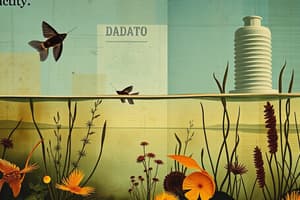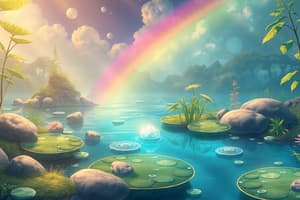Podcast
Questions and Answers
__________________ is the study of the relationship between living organisms, including humans and their physical environment.
__________________ is the study of the relationship between living organisms, including humans and their physical environment.
Ecology
What is the study of the relationship between living organisms, including humans and their physical environment?
What is the study of the relationship between living organisms, including humans and their physical environment?
Ecology
All ecosystems contain many different food chains.
All ecosystems contain many different food chains.
True (A)
Oikos is a Greek word which means_______________.
Oikos is a Greek word which means_______________.
What is biodiversity?
What is biodiversity?
Flashcards are hidden until you start studying
Study Notes
Ecology - The Study of Earth's Household
- Ecology is the study of the relationship between living organisms and their physical environment.
- It aims to understand the connections between plants, animals, and their surroundings.
- Ecology provides information about the benefits of ecosystems and sustainable resource management.
- The word "ecology" comes from the Greek words "oikos" (meaning house or household) and "logos" (meaning study).
Factors of Ecology
- Biotic factors: These are the living organisms within an ecosystem, such as plants, animals, fungi, and bacteria.
- Abiotic factors: These are the non-living components of an ecosystem, such as temperature, sunlight, water, soil, and air.
Ecosystem
- An ecosystem consists of a community of organisms interacting with their environment.
- Interactions within ecosystems are essential for maintaining balance and stability.
Photosynthesis
- Photosynthesis is the process by which plants convert light energy into chemical energy (sugars).
- This process is vital for the production of food for all living organisms.
Food Chain
- A food chain illustrates the flow of energy and nutrients through an ecosystem.
- It shows how organisms obtain food and how energy and nutrients are passed from one organism to another.
Food Chain - Parts
- Producers: Plants are the primary producers, they make their own food through photosynthesis.
- Consumers: Animals that eat plants (herbivores), animals that eat other animals (carnivores), and animals that eat both plants and animals (omnivores).
- Decomposers: Fungi and bacteria break down dead organisms, returning nutrients to the soil.
Food Web
- A food web is a network of interconnected food chains within an ecosystem.
- It shows the complex relationships between different organisms and their food sources.
Biodiversity
- Biodiversity refers to the variety of life forms on Earth, encompassing all species, ecosystems, and ecological processes.
- The Philippines is one of 18 mega-biodiverse countries in the world.
Importance of Decomposers
- Decomposers play a crucial role in the ecosystem by breaking down dead organisms and releasing nutrients back into the soil.
- These nutrients are then used by plants to grow, continuing the cycle of energy and matter.
Studying That Suits You
Use AI to generate personalized quizzes and flashcards to suit your learning preferences.




